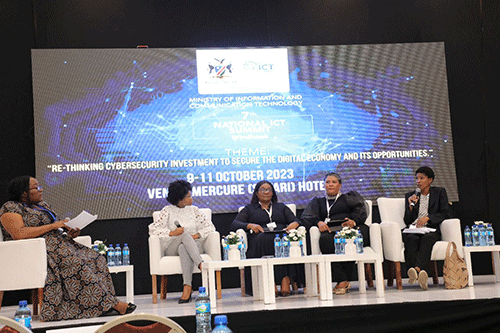Covid-19 has brought about a change in the world of medicine by bringing services to people’s convenience.
As a result, telemedicine has led to patients no longer having to physically go to doctors for consultation, says clinical psychologist Justine /Oaes.
She said one can now also consult doctors telephonically or access online therapy, and get prescriptions online as well.
This includes a low cost and also flexible working hours for the doctors.
“There are many people who don’t want to go to psychologists because of the stigma around mental health issues. So, you can do it from the privacy of your own house without being mindful of who is seeing you coming out of the practice,” stated /Oaes during a panel discussion on mental health and wellbeing in cyberspace at the 7th ICT Summit in Windhoek this week.
She added that online therapy methods, such as cognitive behavioural therapy (CBT), have been found to be quite effective in terms of depression, anxiety and also behavioural problems. CBT is a form of psychological treatment that has been demonstrated to be effective for a range of problems, including depression, anxiety disorders, alcohol and drug use problems, marital problems, eating disorders and severe mental illness.
Also commenting on the impact of mental health and AI, Childline/Lifeline’s Zelnadia de Waal said in terms of accessibility, helpline services are available in all 14 regions in Namibia.
“The stigma that goes along with mental health is that people don’t want to be seen coming out of a mental health facility. So, it makes it easier for everybody to access the service digitally. Also, a lot of people we found cannot vocalise or express themselves vocally. It thus makes it easier for them through typing the issue or sharing through a digital platform,” she observed.
De Waal said as much as the pandemic brought trauma, Covid-19 has brought a lot of new things that they have learned.
On the side-effects of the role of the
digital space on Namibians, chief psychologist at the industrial relations ministry Oletu Nakaambo said online notifications are very disruptive to the attention span.
“The TikTok brain is a situation where children consume about 15 seconds of entertainment, and they cannot focus on long-term communication. So, that might affect learning and the retention of information,” she stated.
Nakaambo said excessive screen time, especially before bedtime, can disrupt sleep patterns by interfering with the child’s sleeping pattern, as the blue light emitted by the screen can also inhibit the production of melatonin, a hormone that regulates sleep.
“If you have a lot of lack of sleep, it will affect your concentration and productivity at work, and it also affects your mood, where you might become moody, irritable and to an extent, depressed,” she added.
De Waal chipped in and said one finds children who are so stuck to gadgets that they watch TV all day.
“Technology and children, especially teenagers, find their way in life because of parenting absentees, who are not involved in their children’s lives. Once the baby starts crawling, a gadget is put in their hands and they have to find their ways,” De Waal stated bluntly. She said teenagers are following influencers because their parents cannot control them, as parents are also stuck to their gadgets.
De Waal: “There is no bonding anymore, and that is the central situation for families. That disrupts culture, as we are taking on different cultures globally. There are so many challenges when it comes to families in terms of mental health and in terms of hindering families from forming bonds”.
– psiririka@nepc.com.na



